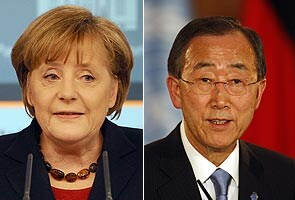
Cairo:
The leaders of France, Germany, Britain, Italy and Spain ratcheted up the pressure on Thursday on Egyptian President Hosni Mubarak, saying that Egypt's political transition "must start now".
German Chancellor Angela Merkel also insisted that Mubarak's government put a stop to attacks against anti-government protesters and journalists.
Foreign journalists were beaten with sticks and fists by pro-government mobs on Thursday, and dozens were detained by security forces.
In Berlin, UN Secretary-General Ban Ki-moon condemned the "intimidation and restrictions" being placed on journalists and human rights groups in Cairo.
"Let me absolutely clear: this is outrageous and totally unacceptable," he said after meeting Germany's president, Christian Wulff. "It must stop now."
A joint statement from the five European leaders said they are watching the unrest in Egypt with deep concern and condemned "all those who use or encourage violence, which will only aggravate the political crisis in Egypt."
The statement from Merkel, French President Nicolas Sarkozy, British Prime Minister David Cameron, Italian Premier Silvio Berlusconi and Spanish Prime Minister Jose Luis Rodriguez Zapatero urged an immediate "quick and orderly transition to a broad-based government."
Speaking in Madrid, Merkel said Mubarak's government bears responsibility for ending the attacks and making sure those responsible are arrested and prosecuted.
"Millions of Egyptians have raised their voice in the past few days, they took to the streets and nobody should think that things can just carry on as they are," she said.
"Instead, there has to be a renewal, there has to be change, a real change. Otherwise people won't be satisfied."
The statement and the leaders' comments came as protesters and regime supporters skirmished for a second day on Thursday in central Cairo.
Mubarak, 82, has promised not to run in next fall's election but has refused to step down.
Protesters have accused his regime of hiring thugs and plainclothes police to crush their nine-day-old movement.
EU foreign policy chief Catherine Ashton said on Thursday that Egyptian authorities are accountable if they fail to protect peaceful demonstrators.
"I spoke with (Egyptian) Vice President Suleiman about an hour and a half ago and I impressed upon him the need to show transition, to show movement and to keep calm and order," she said.
Journalists covering Egypt's unrest have been beaten, stabbed, hit with pepper spray and threatened and detained by Mubarak loyalists.
The European leaders' statement said such attacks are "completely unacceptable."
Meanwhile, dozens of Egyptians protested outside the Egyptian embassy in Beirut on Thursday, adding their voices to the mass protest movement calling for Mubarak's ouster.
Lebanese army forces and police stepped up security measures around the embassy to prevent the protesters from reaching the building.
Minor scuffles broke out as the protesters tried to remove the reinforcements, including a barbed wire fence, in order to make their way to the Embassy and have their protest heard.
No injuries were reported.
German Chancellor Angela Merkel also insisted that Mubarak's government put a stop to attacks against anti-government protesters and journalists.
Foreign journalists were beaten with sticks and fists by pro-government mobs on Thursday, and dozens were detained by security forces.
In Berlin, UN Secretary-General Ban Ki-moon condemned the "intimidation and restrictions" being placed on journalists and human rights groups in Cairo.
"Let me absolutely clear: this is outrageous and totally unacceptable," he said after meeting Germany's president, Christian Wulff. "It must stop now."
A joint statement from the five European leaders said they are watching the unrest in Egypt with deep concern and condemned "all those who use or encourage violence, which will only aggravate the political crisis in Egypt."
The statement from Merkel, French President Nicolas Sarkozy, British Prime Minister David Cameron, Italian Premier Silvio Berlusconi and Spanish Prime Minister Jose Luis Rodriguez Zapatero urged an immediate "quick and orderly transition to a broad-based government."
Speaking in Madrid, Merkel said Mubarak's government bears responsibility for ending the attacks and making sure those responsible are arrested and prosecuted.
"Millions of Egyptians have raised their voice in the past few days, they took to the streets and nobody should think that things can just carry on as they are," she said.
"Instead, there has to be a renewal, there has to be change, a real change. Otherwise people won't be satisfied."
The statement and the leaders' comments came as protesters and regime supporters skirmished for a second day on Thursday in central Cairo.
Mubarak, 82, has promised not to run in next fall's election but has refused to step down.
Protesters have accused his regime of hiring thugs and plainclothes police to crush their nine-day-old movement.
EU foreign policy chief Catherine Ashton said on Thursday that Egyptian authorities are accountable if they fail to protect peaceful demonstrators.
"I spoke with (Egyptian) Vice President Suleiman about an hour and a half ago and I impressed upon him the need to show transition, to show movement and to keep calm and order," she said.
Journalists covering Egypt's unrest have been beaten, stabbed, hit with pepper spray and threatened and detained by Mubarak loyalists.
The European leaders' statement said such attacks are "completely unacceptable."
Meanwhile, dozens of Egyptians protested outside the Egyptian embassy in Beirut on Thursday, adding their voices to the mass protest movement calling for Mubarak's ouster.
Lebanese army forces and police stepped up security measures around the embassy to prevent the protesters from reaching the building.
Minor scuffles broke out as the protesters tried to remove the reinforcements, including a barbed wire fence, in order to make their way to the Embassy and have their protest heard.
No injuries were reported.
Track Latest News Live on NDTV.com and get news updates from India and around the world

